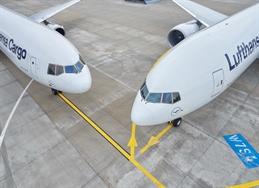
Boeing expects the global air cargo fleet to grow by more than 60% through 2039, banking on the need for more freighters to be driven by e-commerce and the need to move more high-value commodities.
The American planemaker said that, enabled by a rebound in global trade and long-term growth, the forecast demand for freighters over the next 20 years is 2,430, including 930 new production freighters and 1,500 freighters converted from passenger airplanes.
World air cargo traffic is also expected to grow at 4% per year over the next 20 years.
“Freighter operators have been in a unique position in 2020 to meet market requirements for speed, reliability and security, transporting medical supplies and other goods for people and communities around the world,” Darren Hulst, vice president of commercial marketing at Boeing, told a virtual briefing as the company released its biennial World Air Cargo Forecast (WACF), which delved into the impacts of Covid-19, current opportunities and the outlook in terms of demand over the next two decades.
“Looking ahead, dedicated freighters will be even more critical to compete in air cargo markets; they carry more than half of air cargo traffic, and airlines operating them earn nearly 90% of air cargo industry revenue,” he said.
During the onslaught of the coronavirus pandemic, Hulst said 90 aircraft have been added to the freighter fleet since January and freighter operations rose by 120% of the normal level.
Hulst noted that dedicated freighters will continue to carry more than 50% of world air cargo traffic – and that “more than 90% of the world’s freighter capacity are Boeing freighters.”
E-commerce boost cited
Meanwhile, in addition to projecting long-term demand for freighters, Boeing said e-commerce gave the industry a major lift as passenger demand remained weak.
Hulst cited China’s 11.11 Shopping Festival as an example, which saw Alibaba’s revenue from the event up 26% this year over 2019. Another Chinese e-commerce company, JD.Com, also reported a 33% sales growth in the festival for 2020.
He said Alibaba’s logistics arm, Cainiao, alone, flew more than 700 charter flights for deliveries outside China during the shopping festival.
Global e-commerce revenue growth, in general, is also “nearly doubling” every four years, the Boeing executive said.
“E-commerce, which was growing at double-digit rates prior to the pandemic, has accelerated its impact on the air cargo market as more businesses shifted to online selling platforms,” Hulst said.
Year-to-date through September, express carriers increased traffic by 14%.
Meanwhile, passenger belly cargo, which in 2019 accounted for about half of the world air cargo capacity, was significantly reduced when airlines parked thousands of planes, Boeing said.
In turn, freighter operators responded by operating above normal utilization levels, and traffic for all-cargo carriers grew 6%.
“So far in 2020, approximately 200 airlines used more than 2,000 passenger widebody aircraft for cargo-only operations to generate cash flow and support global supply chains,” Hulst said.
“These passenger freighters have taken up some of the capacity shortfalls and, in some cases, generated quarterly profits for carriers despite minimal passenger operations.”
Vaccine distribution
Hulst said air cargo is also set to support the distribution of Covid-19 vaccine, saying the top 10 pharmaceutical exporting countries typically use air cargo for one-quarter of shipments.
Based on 2019 data shown, China – which accounts for the most pharmaceutical exports – makes significant use of air transport, although maritime still gets the lion share of the shipments. Other pharma exporting countries include India, Germany, the United States, France, Singapore, Mexico, Italy, the United Kingdom and countries in South America.
The International Air Transport Association (IATA) earlier said 8,000 jumbo jets are needed to deliver the coronavirus vaccine globally and will be the “largest transport challenge ever” to the airline industry.
Asia to lead industry growth
In its latest forecast, Boeing said East Asia markets will continue to lead industry growth.
Hulst said in Asia Pacific, demand for new large widebodies will reach 915 between 2020 and 2039. The number is expected to reach 795 for North America, 435 for Europe, Russia and Central Asia, 210 for the Middle East and Africa, and 75 for Latin America.
Meanwhile, East Asia-North America will top air cargo traffic flows from 2020-2039 according to Boeing’s forecast – seen to grow by 4.3%. East Asia-Europe will expand by 4.4%, while Intra-East Asia will rise by 4.9%.
Meanwhile, traffic flows within North America will grow by 2.6%, 2.3% for Europe-North America and 5.8% for domestic China.



